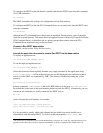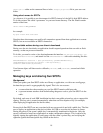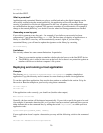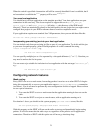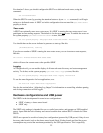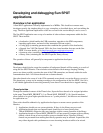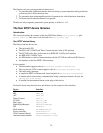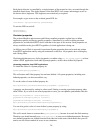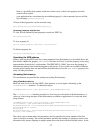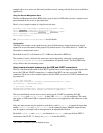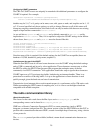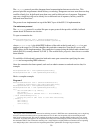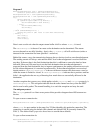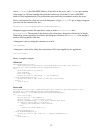
25
The libraries only use system priorities in three cases:
1. To guarantee that application threads don't run during a system operation during which the
system may be in an inconsistent state.
2. To guarantee short uninterruptible periods of operation for critical hardware interaction.
3. To ensure that the attention button is recognised.
Threads are only assigned a permanent system priority to achieve 1. or 3.
The Sun SPOT device libraries
Introduction
This section describes the contents of the Sun SPOT base library,
spotlib_device.jar
plus
spotlib_common.jar
(the source code for both is in
spotlib_source.jar
).
Sun SPOT device library
The library contains drivers for:
• The on-board LED
• The PIO, AIC, USART and Timer-Counter devices in the AT91 package
•
The CC2420 radio chip, in the form of an IEEE 802.15.4 Physical interface
• An IEEE 802.15.4 MAC layer
• An SPI interface, used for communication with the CC2420 and off-board SPI devices
•
An interface to the Sun SPOT's flash memory
It also contains:
• The basestation support code (in
com.sun.spot.peripheral.basestation
)
• The over-the-air (OTA) control support code (in
com.sun.spot.peripheral.ota
)
•
The radio policy manager
• A simple on-SPOT test framework, based on junit (in
com.sun.spot.testFramework
)
• A framework for inter-isolate communication using a remote procedure call style (in
com.sun.spot.interisolate
)
•
A handler for the attention button on the edge of the device
For details about using these devices and features see the respective Java interface:
Device Interface
LED
ILed
PIO
IAT91_PIO
AIC
IAT91_AIC
Timer-Counter
IAT91_TC
CC2420
I802_15_4_PHY
MAC layer
I802_15_4_MAC
RadioPolicyManager
IRadioPolicyManager
SPI
ISpiMaster
Flash memory
IFlashMemoryDevice
Power controller
IPowerController
OTA Command Server
OTACommandServer (class)
Attention button handler
FiqInterruptDaemon (class)



